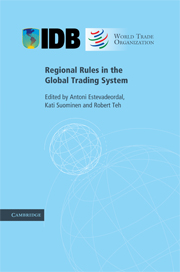Book contents
- Frontmatter
- Contents
- List of figures
- List of tables
- List of Contributors
- Foreword
- Acknowledgements
- List of abbreviations
- 1 Introduction
- 2 Big-Think Regionalism: a critical survey
- 3 Market access provisions in regional trade agreements
- 4 Trade remedy provisions in regional trade agreements
- 5 A mapping of regional rules on technical barriers to trade
- 6 Services liberalization in the new generation of preferential trade agreements: how much further than the GATS?
- 7 Mapping investment provisions in regional trade agreements: towards an international investment regime?
- 8 Competition provisions in regional trade agreements
- Appendix: List of RTAs included in the survey
- Index
6 - Services liberalization in the new generation of preferential trade agreements: how much further than the GATS?
Published online by Cambridge University Press: 01 March 2011
- Frontmatter
- Contents
- List of figures
- List of tables
- List of Contributors
- Foreword
- Acknowledgements
- List of abbreviations
- 1 Introduction
- 2 Big-Think Regionalism: a critical survey
- 3 Market access provisions in regional trade agreements
- 4 Trade remedy provisions in regional trade agreements
- 5 A mapping of regional rules on technical barriers to trade
- 6 Services liberalization in the new generation of preferential trade agreements: how much further than the GATS?
- 7 Mapping investment provisions in regional trade agreements: towards an international investment regime?
- 8 Competition provisions in regional trade agreements
- Appendix: List of RTAs included in the survey
- Index
Summary
In the context of stalled multilateral trade negotiations, preferential trade agreements (PTAs) have continued to proliferate, raising important trade and policy issues. Unlike in any other period since the establishment of the multilateral trading system, all important trading nations are now involved in PTA discussions of one form or another. In the midst of the recent flurry of PTA activity, this paper attempts to fill a gap in the literature by providing a comprehensive evaluation of the liberalization commitments contained in the recent wave of preferential trade agreements on services. Indeed, the trade literature has tended to limit its examination of services components of PTAs to the type of rules they contain and to such other characteristics as whether a GATStype positive listing or NAFTA-type negative listing was used in undertaking commitments.
The paper hopes to make a contribution at the empirical level by comparing the commitments undertaken in PTAs with prevailing GATS commitments, as well as offers in the ongoing Doha Round negotiations so as to assess how much further access is granted under PTAs. The review of recent services PTAs should help shed light on some basic questions: do PTA commitments go further than existing GATS commitments and GATS offers and, if so, to what extent? What types of PTAs appear to encourage more liberalization (in terms of scheduling approaches, countries involved, etc.)? Do PTAs encourage actual liberalization, i.e. going beyond the status quo?
- Type
- Chapter
- Information
- Regional Rules in the Global Trading System , pp. 316 - 364Publisher: Cambridge University PressPrint publication year: 2009
- 2
- Cited by



